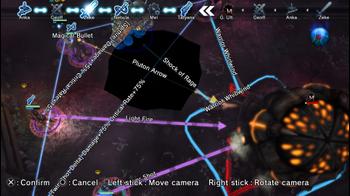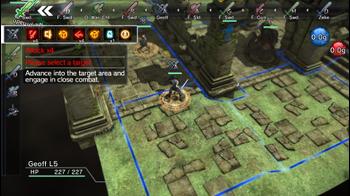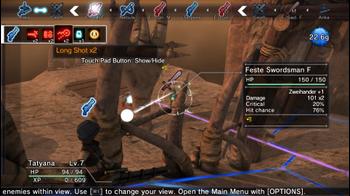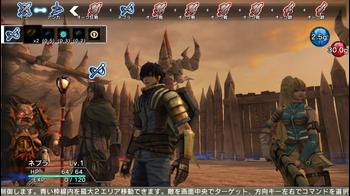
Natural Doctrine Review
The inaugural title from Kadokawa Games, Natural Doctrine is more of an experiment than a full experience. The combat is unique and several mechanics are uncommon for strategy games. However, while it avoids the issue of being trite or generic, a number of other problems permeate an otherwise intriguing take on the genre.
At its core, Natural Doctrine is a strategy RPG that takes place on a grid. Like other examples of its breed, you obtain a variety of unit types to work with, from physical attack units to ranged attackers to healers. Unlike most, however, the design is set in a 3-dimensional environment, and unit positioning within each square is not only possible, but key to surviving in combat. You can also place up to four units within each square, which will affect how that group behaves during battle.
Natural Doctrine is turn-based with a twist. If I were to list out how this system specifically works in this review, it would sound a lot more complicated than it actually is. Essentially, each character gets one turn each round, but they can also gain more turns by ‘linking’ when certain actions are performed. This is also true for the enemies you face.
This “link-turn” mechanic is the centerpiece around which Natural Doctrine’s combat sits. If you understand how to best avoid enemies from gaining extra turns and how to maximize your own turn output, you will find success more often than not.
Using combinations of actions while linking can boost attack parameters. For instance, having two gun-wielding units converge on a single target will boost hit percentage and critical rate. These are directly tied into unit placement, so careful planning of both turn positions and actions will prove worthwhile.
There’s one more key aspect to the gameplay, and that is the magical ‘currency’ known as Pluton. Pluton is used to cast magic spells as well as a few other abilities, and each has a certain Pluton cost associated with it. Pluton is gained by opening chests. Depending on play style, you might find yourself repeatedly taking on free missions in the mines to increase your Pluton reserve, but personally I had plenty by the end without taking extra trips outside the main story.

As I understand it, in the time since the original Japanese release of Natural Doctrine, the developers have released a few patches to mitigate some unfair difficulty issues it originally had including with its localization. I played through the main story on Normal difficulty without too much trouble.
Even then, the battles are not a cakewalk, but knowing basic tactics will go a long way. For example, using your golem unit to block enemies at a choke point and backing him up with gunner units will come in handy on more than a few occasions. At other times, it might serve best to rush the enemy to take out certain units quickly before they can cause serious problems.
Sometimes certain levels took a few tries to become acquainted with new enemy types, or sometimes a mid-battle objective change would catch me off-guard on the first attempt, but otherwise the challenge presented is fair most of the time.
The main factor in the difficulty is that no party member is allowed to die during an encounter. This means that the defensive approach gains priority, as the game will not forgive the mistake of leaving any party member vulnerable. Patience also goes a long way. Many storyline levels do have a checkpoint or two during a fight, which is nice.
While it puts a few interesting twists on typical SRPG mechanics, Natural Doctrine never reaches its full potential. Although it’s nice that it tries to do something different from other franchises in the genre, that isn't enough for the game stand out on its own. You can’t fault it for being overdone, trite or commonplace, because it’s none of those things. When the title was first revealed, some comparisons were made to Valkyria Chronicles based on the real time aspects couple with strategic gameplay, but it’s not much like that either.
When one starts to get the hang of how to manipulate the link mechanics, they might find themselves performing actions that don’t really make much coherent sense elsewhere in order to take advantage of the system in place. For instance, using potions on characters will give them extra turns. I found myself slinging these around the battlefield in order to gain more actions, even if nobody needed the HP. Sometimes working with strategies like this helps tremendously even if the logic isn’t really there as to why it works that way.
The length is also fairly short for the genre – I completed it in about 20 hours. A handful of maps had refreshing or intriguing elements, but several were also quite mundane. I had started imagining levels and environments that might be possible within the systems in place, but before I knew it, the story was over and nothing stood out as fantastic. You just go straight to the credits right after the final boss encounter with no real conclusion to anything that happened.
Narrative aspects of Natural Doctrine are best described as watered-down or flat. The setting is barely established, the plot line is extremely simple, characters are exceedingly one-note, and the villains are about as interesting as insects (spoiler: the main antagonists are actually insects). Safe to say, if you are looking for a plot that engages you or compelling characters, you aren’t going to find them here.
Most of the voice-acting is fine given the material, but a few bad performances from certain characters are hard to ignore. Additionally, audio balance between music and voice sometimes makes it’s hard to hear what characters are saying.
I commend Natural Doctrine for trying something new. Fans of the genre who want to see a fresh take on typical elements of SRPGs might appreciate Kadokawa’s attempt to experiment, but as a whole, these ideas are rough around the edges and the game is difficult to recommend.


